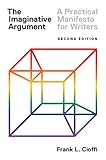The Imaginative Argument : A Practical Manifesto for Writers - Second Edition / Frank L. Cioffi.
Material type: TextPublisher: Princeton, NJ : Princeton University Press, [2017]Copyright date: ©2018Edition: SecondDescription: 1 online resource (344 p.) : 3 b/w illusContent type:
TextPublisher: Princeton, NJ : Princeton University Press, [2017]Copyright date: ©2018Edition: SecondDescription: 1 online resource (344 p.) : 3 b/w illusContent type: - 9780691174457
- 9781400888191
- 808/.042 23
- PE1433
- online - DeGruyter
- Issued also in print.
| Item type | Current library | Call number | URL | Status | Notes | Barcode | |
|---|---|---|---|---|---|---|---|
 eBook
eBook
|
Biblioteca "Angelicum" Pont. Univ. S.Tommaso d'Aquino Nuvola online | online - DeGruyter (Browse shelf(Opens below)) | Online access | Not for loan (Accesso limitato) | Accesso per gli utenti autorizzati / Access for authorized users | (dgr)9781400888191 |
Frontmatter -- Contents -- Preface -- Acknowledgments -- Introduction -- I. Getting Started -- 1. On the Writing of Essays -- 2. Audience: Your Projected Reader(s) -- 3. Prewriting and the Writing Process -- II. Features and Fundamentals of the Imaginative Argument -- 4. The Thesis -- 5. Developing an Argument -- 6. The Research - Based Argument in the Digital Age -- 7. Paragraph Design -- III. New Forms, Avant - Garde Strategies -- 8. Different Structures, Novel Organizational Principles -- 9. Saying Something New: Ways toward Creativity -- 10. Continuous Composing: Streamwriting -- IV. Revising and Reimagining -- 11. Rewriting and Revising -- 12. Figures and Fallacies, or Being Forceful but Not Cheating at Argument -- 13. The Argument of Style -- V. Creativity and Originality in the Epoch of the Post - Original -- 14. Technology and Writing: On Being Imaginative Now -- 15. Concluding a Manifesto: The Future of Writing -- A. Instructors' Guide: How to Use This Book in Class -- B. Sample Essays -- Works Cited -- Index
restricted access online access with authorization star
http://purl.org/coar/access_right/c_16ec
More than merely a writing text, The Imaginative Argument offers writers instruction on how to use their imaginations to improve their prose. Cioffi shows writers how they can enliven argument--the organizing rubric of all persuasive writing--by drawing on emotion, soul, and creativity, the wellsprings of imagination. While Cioffi suggests that argument should become a natural habit of mind for writers, he goes still further, inspiring writers to adopt as their gold standard the imaginative argument: the surprising yet strikingly apt insight that organizes disparate noises into music, that makes out of chaos, chaos theory. Rather than offering a model of writing based on established formulas or templates, Cioffi urges writers to envision argument as an active parsing of experience that imaginatively reinvents the world. Cioffi's manifesto asserts that successful argument also requires writers to explore their own deep-seated feelings, to exploit the fuzzy but often profoundly insightful logic of the imagination. But expression is not all that matters: Cioffi's work anchors itself in the actual. Drawing on Louis Kahn's notion that a good architect never has all the answers to a building's problems before its physical construction, Cioffi maintains that in argument, too, answers must be forged along the way, as the writer inventively deals with emergent problems and unforeseen complexities. Indeed, discovery, imagination, and invention suffuse all stages of the process. The Imaginative Argument offers all the intellectual kindling that writers need to ignite this creativity, from insights on developing ideas to avoiding bland assertions or logical leaps. It cites exemplary nonfiction prose stylists, including William James, Ruth Benedict, and Erving Goffman, as well as literary sources to demonstrate the dynamic of persuasive writing. Provocative and lively, it will prove not only essential reading but also inspiration for all those interested in arguing more imaginatively more successfully.This edition features new chapters that cover the revision process in greater depth, as well as the particular challenges of researching and writing in the digital age, such as working with technology and avoiding plagiarism. The book also includes new sample essays, an appendix to help instructors use the book in the classroom, and much more.
Issued also in print.
Mode of access: Internet via World Wide Web.
In English.
Description based on online resource; title from PDF title page (publisher's Web site, viewed 27. Sep 2021)


